Chapter Eight: The Zoo Park Send Off
Wherein Otis Bulfinch vows his revenge
July 4, 1897
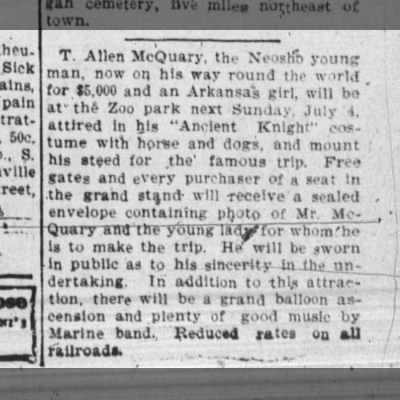
Otis Bulfinch was an unimpressive man, short of stature and quick of movement–rather like a sidewalk sparrow pecking at a crust of bread. He looked as if he had been lifted from the sketch pad of T.S. Sullivant with a Pickwickian noggin and diminutive physique. His regrettable appearance was somewhat ameliorated–or so he fancied–by a massive unkempt mustache that nevertheless created the unfortunate impression whenever he spoke that his mouth was the pink aperture of a cat's ass. When he donned his top hat (a fashion choice that added a cubit to his height but naught to his dignity) and walked with his umbrella, Otis looked like a Puck cartoon come to life. Men ignored him, women giggled at him, and unruly children threw apples at his hat. To make matters worse, his interior was inferior to his exterior: Otis Bulfinch's imagination was less impressive than the man himself. He could write words, but he could not create worlds. He disbelieved in fairies and phrenology and Santa Claus. He thought religion was a derivative and tedious species of mythology. His thoroughgoing skepticism did confess one article of faith, however: He believed words could be construed to convey facts, as preposterous a doctrine as transubstantiation, but there you have it. Bulfinch's dogged faith in "facts" and "words" made him the ace reporter of the Springfield Leader.
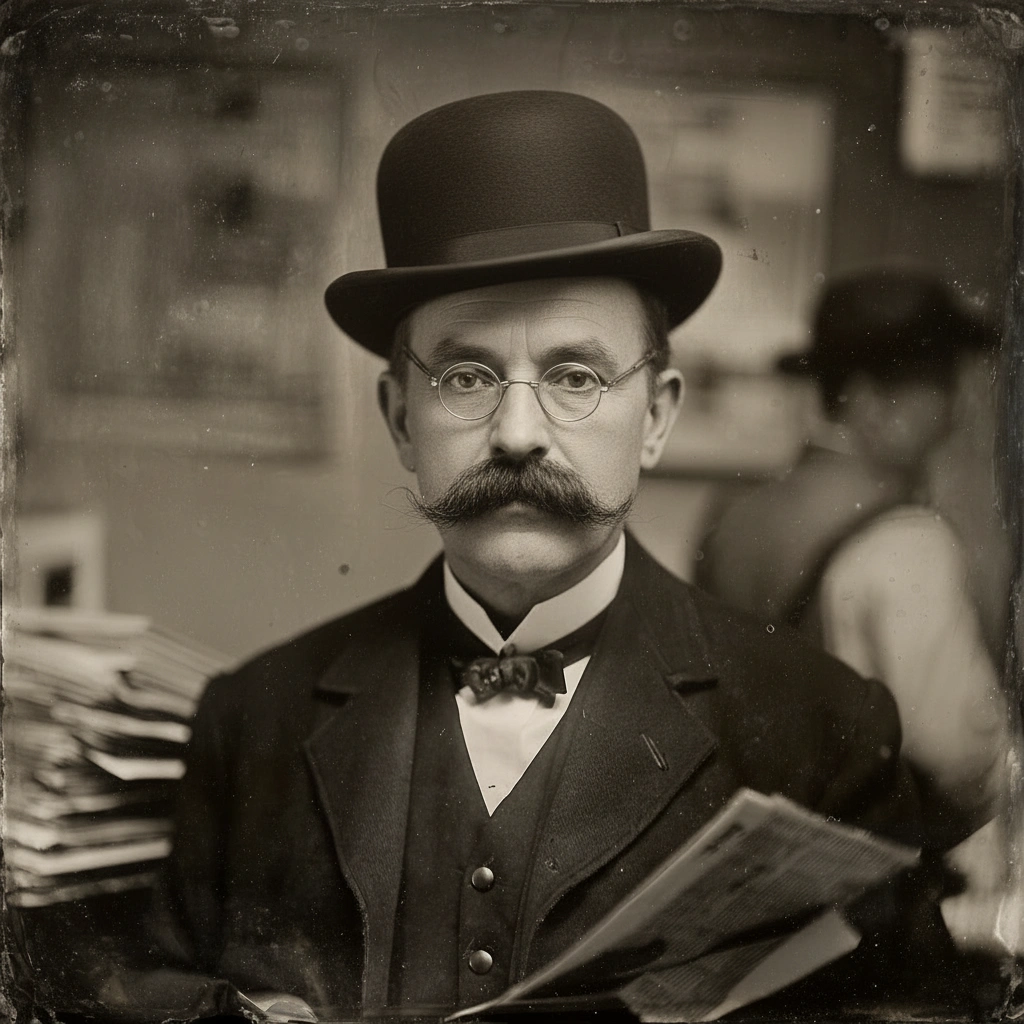
So, that's Otis Bulfinch. His buddy Van Hennessey, on the other hand, was tall with broad shoulders and narrow hips; his chin was chiseled and cleft with a manly indentation, and his eyebrows accentuated penetrating eyes and a noteworthy nose. Though he lathered and shaved with the intensity of an Edison, by noon the grit of new beard peppered his face. Hennessey's fedora, too, was all business, dented in the crown and shaped into prow-cleaving triangularity. He wore his ties long and his shoes shiny. Like many tall men, he had a sure sense of his importance, and his considerable self-esteem was expressed in firm handshakes and steady gazes. He liked himself very much. When he paid his bill at the cafe register, he took it for granted that the come-hither eyes of the illustrated Gibson girl hanging on the wall were admiring only him.
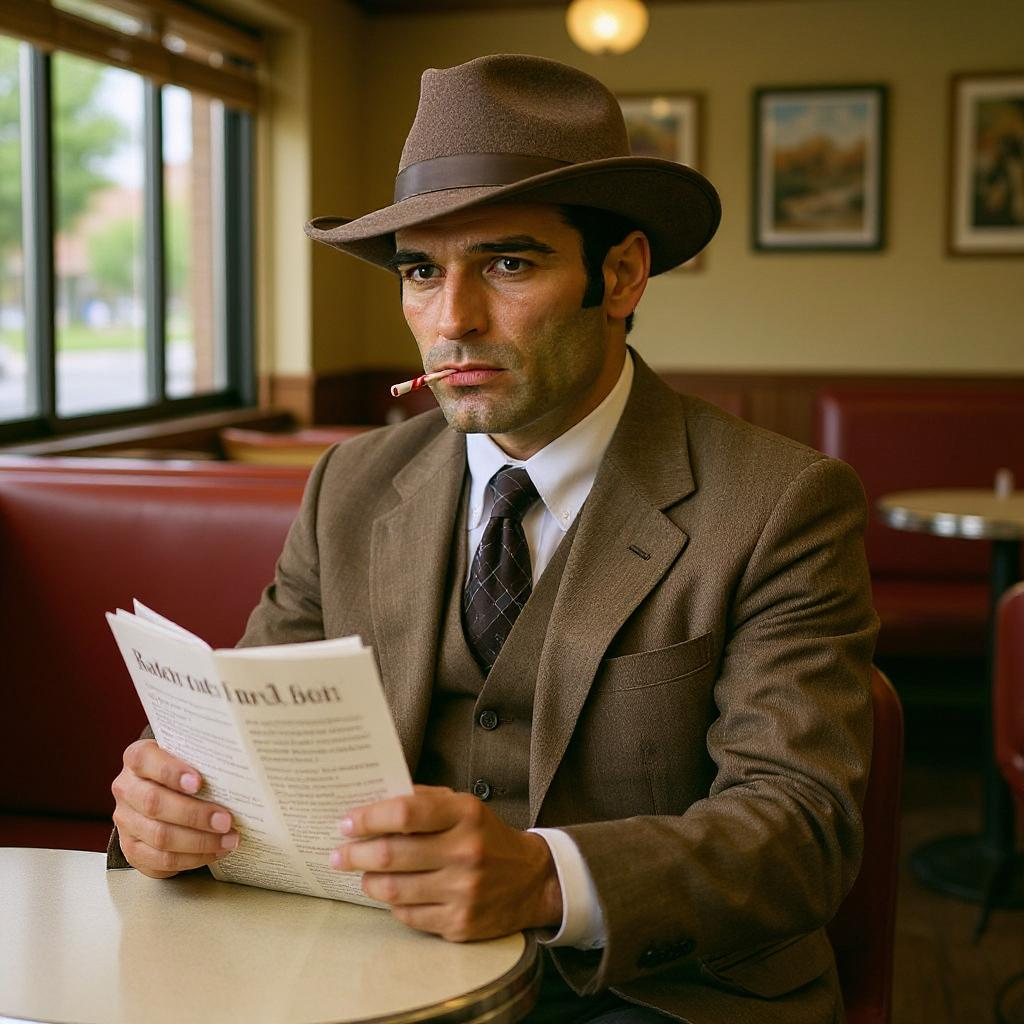
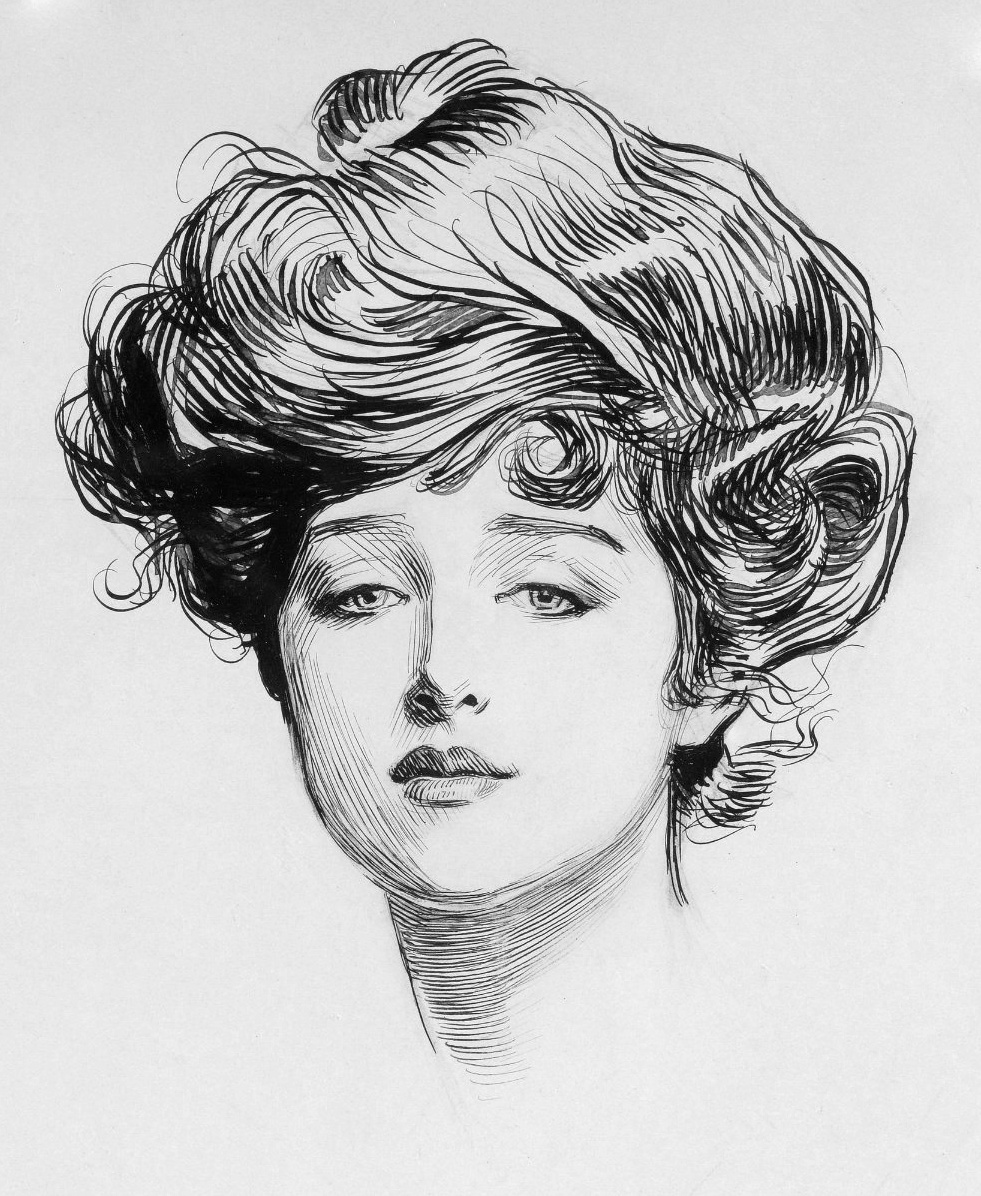
I love you, Van, oh, yes, I do!
Nevertheless, Van Hennessey's self-confidence contributed to his utter failure as a reporter. Nobody wanted to talk with Hennessey because nobody liked him because their tragic stories only became opportunities for him to talk about his own disappointments. Train wrecks and mob violence and the clashing of armies were diminished into reminiscences of canoeing mishaps and waiting in line at the grocer's. He rendered serial killers as mundane as shopkeepers. Parents read his accounts of wars and rumors of wars to lull their children to sleep. Even his headlines were yawners, regardless of font size or ink color or punctuation. Consequently, Dobbins, the hard-as-flint editor of the Springfield Leader, installed Hennessey in the advertising department. He might stride into the Springfield Leader like Caesar on the verge of a conquest, but ads for candy bars and hair tonics and constipation remedies followed in his wake.
Dobbins assigned Bulfinch to cover the story of McQuary's departure on his great quest because he, that is, Dobbins thought exposing McQuary as a fraud would sell papers; he assigned Hennessey to the story because he also thought promoting the fraud would sell papers. Either way, the Springfield Leader couldn't lose. That's what made Dobbins such an excellent editor.
Such were the nemeses of T. Allen McQuary.
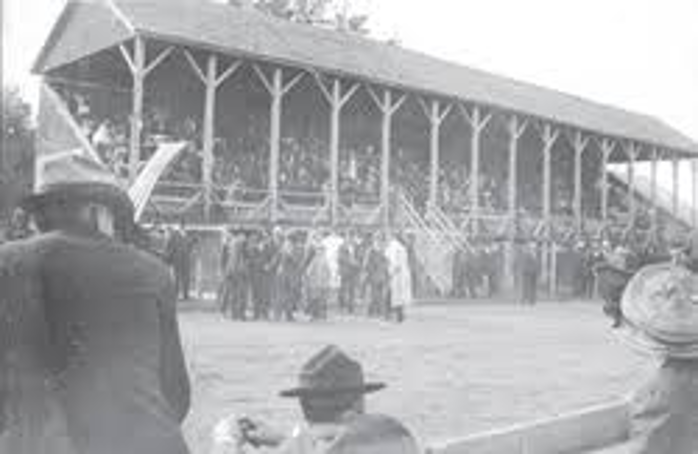
By the time Bulfinch and Hennessey arrived at Zoo Park, a crowd of fifty or so people had gathered in front of the grandstand. The stage was festooned with red, white and blue bunting for the Fourth, and a brass band was playing Sousa marches. Our two reporters bought soda pops from a cart and wended their way to the front of the crowd. The band started playing the National Anthem, the people put their hands over their hearts, and a kid in a nearby field set off a string of firecrackers. When the anthem ended, a restless silence followed, whereupon three men walked up the steps and onto the stage: a shabby man in a seersucker suit and straw hat, a man wearing a monocle and black robe and carrying a Bible, and a young man costumed in purple with a sword on his hip. The young man smiled and surveyed the crow as if he were looking for someone.
Bulfinch whispered to Hennessey, "Wait a minute–do you know who that big fellow is?"
"Who?"
"That's M.S. Glenn, the son of a bitch who sold my mother the phony policy! I should have known he'd be part of this. One good fraud deserves another."
Hennessey said, "And the purple fellow must be McQuary."
"Has to be. And rounding out the whole is Claude Patterson, as venal a judge as ever took a bribe."
"What do you mean?"
"Patterson is the one who demanded that Dobbins retract my article about Glenn and issue an apology. And now I see why. They're in cahoots. I should've guessed."
"I didn't know Dobbins could be so easily persuaded."
"Manipulated, you mean."
"How'd you find out Patterson was involved?"
"I'm a reporter. It's my job. Shh."
The three men on stage had turned to face the crowd, and Glenn was standing behind the podium. He gestured to Judge Patterson on his right and McQuary on his left, and the crowd responded with sporadic applause. Then, Glenn stretched out his hands as if he were trying to calm an unruly crowd outside the Bastille and said, "Thank you! Thank you! Thank you so much for that warm welcome! Today is a momentous day!"
More firecrackers popped in the adjacent field, and there was the whizz-bang of a bottle rocket. Glenn continued, "I know you fine citizens are joining me today to celebrate the Founding of America and the signing of our glorious Declaration. I know that you have come here out of love of country and a deep desire for her continued peace and prosperity after the late unpleasantness."
Bulfinch whispered, "Unpleasantness? Sounds like we had a rash instead of a civil war."
Glenn continued, "But I also know that you came to hear a story of love and adventure, the tale of one man's promise to his beloved, a promise that will ultimately take that man around the world. Indeed, the freedom to risk all for what one loves is the very definition of the 'pursuit of happiness.' What else could those hallowed words mean? That's why this young man who stands at my side, dressed in purple and raring to go, is the incarnation of the American dream! Ladies and gentlemen, I present to you, the one and only T. Allen McQuary, the Purple Knight of the Ozarks!"
More light applause and someone hollered, "Hey, Little Lord Fauntleroy, where'd you get them purple britches?"
Laughter.
Now it was Mack's turn to step forward. He said, "You may well wonder at my curious apparel. Heaven knows I am surprised to find myself costumed thus. But I have come to realize something: True love always appears strange in a world devoid of poetry, among a people who prefer the snap and clap of fireworks to the lilting songs of romance. Yes, I am strangely attired. But I am dressed like this for love, not to garner attention or fame or money. And I trust that's why you came today: Not to mock my clothes but to honor love, the noblest sentiment of the human heart and the highest end of humankind."
Bulfinch muttered, "Good God."
Now Glenn again. "Never have I met a finer man than this young fellow! Never!" Then he proceeded to tell the story about the girl in Arkansas and her stubborn father and the greyhounds and the five thousand dollars and the trip around the world. All the while, Mack stood perfectly erect in noble and unabashed immobility. Finally, Glenn said, "And now I would like to ask Judge Patterson to administer the oath to Mr. McQuary. Judge Patterson?"
Glenn ceded his place at the podium to Patterson, who began speaking in sing-song solemnity, almost as if he were chanting the liturgy at a High Mass. "It is a grave duty I take upon myself this afternoon before you all, namely, to administer the oath to Thomas Allen McQuary with regard to his beloved Arkansas girl, her father's contract, his knightly accoutrement, and his journey around the world. Mr. McQuary, if you please?" Patterson held out the Bible and said, "Place your right hand on the Bible, raise your left hand, and repeat after me. I, Thomas Allen McQuary–"
"I, Thomas Allen McQuary."
"Do solemnly swear that I am undertaking a true quest for the hand of an Arkansas girl and a sum of five thousand dollars, both of which are pledged by the father of the girl, if I successfully circumnavigate the world within the prescribed time of eighteen months."
McQuary repeated these words.
"I further swear that I will ride a black steed and be accompanied by two greyhounds. I will wear the purple garb of the knights of yore as well as a mask befitting the mystery and romance of my quest."
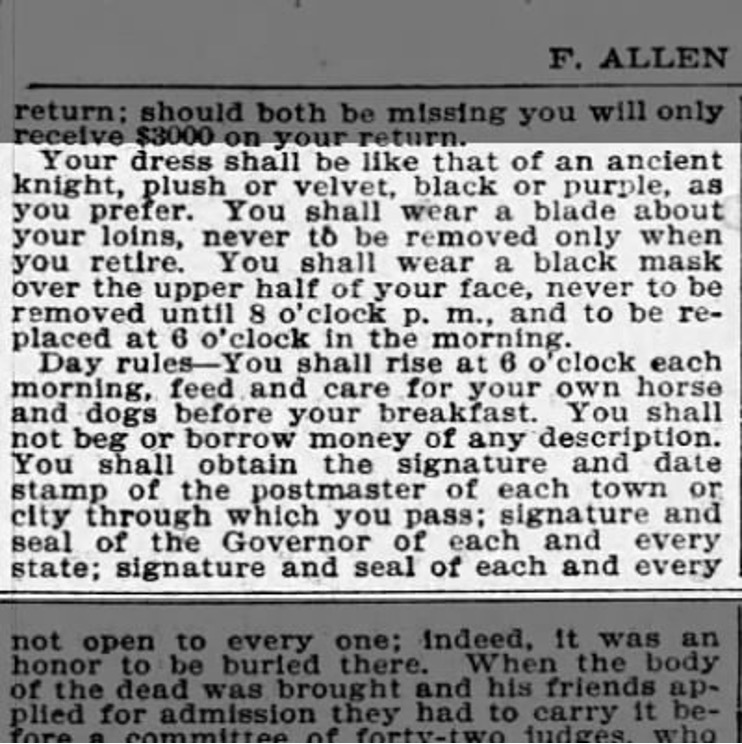
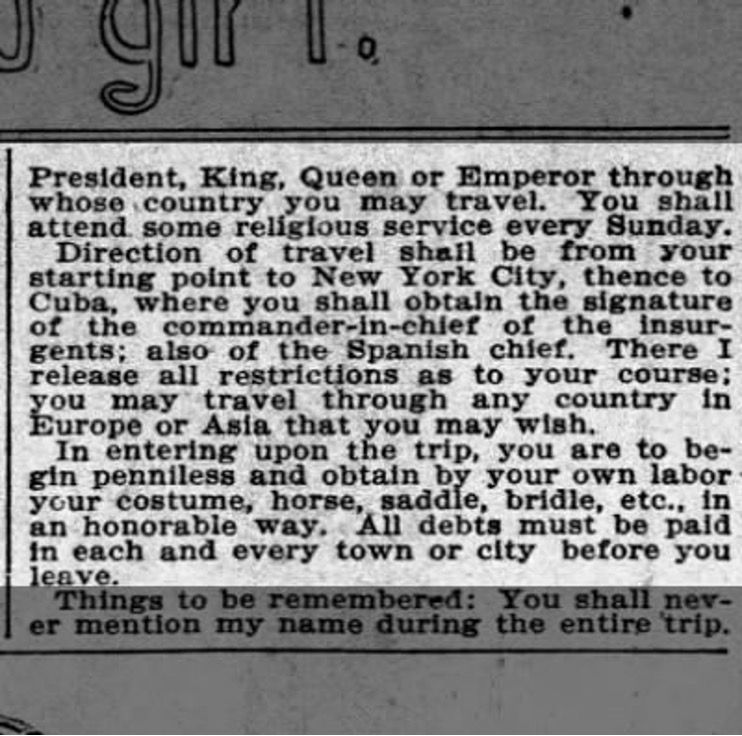
Mack repeated that, too.
Then Judge Patterson intoned about required church services and the vow of poverty–McQuary was forbidden from taking any money with him–and the symbolism of the sword of the Knights of Pythias and the significance of the Spanish poinard and McQuary's ironclad promise to the planter never to reveal his name or that of his daughter, all of which McQuary swore to, until, finally, Patterson said, "So help me, God!"
McQuary said in a loud and certain voice, "So help me, God!"
"So help me God!" said Patterson.
"So help me God!" said Glenn.
And Bulfinch muttered, "So may God help us all. What a farce."
The crowd applauded louder this time, and there were even some cheers. Judge Patterson produced a purple mask that he dangled before the crowd. "Behold the mysterious symbol of love: The Purple Mask! Turn around, if you please, Mr. McQuary."
The crowd applauded with increased enthusiasm. The Judge placed the mask over McQuary's eyes, pulled the strings behind his head, and tied the ends tightly. Then he turned McQuary to face him, placed his hands on McQuary's shoulders, and gave him a brief and manly clasp. He clapped McQuary thrice on his shoulders and turned him to face the audience. "Ladies and gentlemen, I present to you, the Purple Knight of the Ozarks, Mr. T. Allen McQuary!"
A swell of applause and more hollering, and McQuary bowed with becoming modesty.
Glenn returned to the podium and said, "Thank you, Judge Patterson, for executing the oath with such dignity."
The Judge nodded his venerable head, and Bulfinch whispered to Hennessey, "I wonder how much Glenn paid Patterson for that little performance."
Hennessey replied, "I still can't believe Judge Patterson told Dobbins to retract your story."
Bulfinch looked sideways at Hennessey. "You think I'm lying?"
"No, of course not."
On the stage, Glenn said to McQuary, "Well, young man, there's no turning back now!"
Mack laughed and said, "No, sir! Not that I have any desire to. Always before me shines the face of the lovely girl who, like the North Star, leads me ever onward, even to the ends of the earth!"
Then Glenn said, "With respect to the vow you've taken today, I ask you to turn out your pockets." So, McQuary pulled out his purple pockets to show they were empty. Glenn asked, "Do you have any money hidden anywhere on your person?" He sounded as if he was about to perform a magic trick.
"I do not, but to reassure the honest folk gathered here, I assert again, 'I am penniless.'"
"Do you hear that, ladies and gentlemen? The Purple Knight is penniless, as the wager requires." Then Glenn clasped his hands before him as if he were a suppliant appealing to a judge. "So it is to you good people that our knight turns for help. The fabric for his costume was provided by the Misses Pulse of Twills and Frills at the corner of Commercial and Main (with specials going on right now on gingham and hemp fabric) and was hand sewn by Mr. Samuel Shaffner of the House of Tailors (who for over twenty years has been crafting the best in fashion for the man of passion). The sword he carries was bestowed by the Knights of Pythias (a fraternal order promoting friendship and good will the world over), and the greyhounds were the gift of Mr. Canady of the Springfield Fire Department. But even with his habiliment and dogs, what is a Knight without a steed? I'll tell you what such a knight is: Impuissant! Unavailing! Stuck!
"So we turn to you, the generous people of Springfield for assistance. Will you not give a dime, two bits, four bits, or a dollar to send this young man on the most romantic quest of our age? Open hearts are revealed in open hands: That, my friends, is the first principle of Christian charity."
No applause greeted this request, only a sullen silence followed by a discontented murmur. Bulfinch said to Hennessey, "Here we go. I knew that son of a bitch would get around to something like this."
M.S. Glenn was undaunted by the indifferent crowd, and he beseeched them, "Even now baskets are being passed around for your contribution to this great enterprise. Don't ever let it be said that the good people of Springfield are parsimonious when it comes to love!"
The good people of Springfield apparently didn't care whether history judged them as parsimonious or not because they began dispersing in groups of two and three until only the fellows with the baskets and Hennessey and Bulfinch were left on the empty sward. Even the folks in the grandstand were filing down the bleachers and grumbling. Our two reporters were close enough to the stage to hear M.S. say under his breath, "Stingy bastards. They wouldn't pay a nickel to see Jesus Christ eat a bale of hay."
Bulfinch called up to the stage, "Mr. Glenn, I'm Otis Bulfinch with the Springfield Leader. Do you have words for the press about this momentous event?"
Glenn glowered back. "Bulfinch! You've got some gall . . . yeah, I have some words. You thought you had me with your hit piece, didn't you? You and your supposedly senile mother. Well, look who's up here and who's down there. So, tell my Mr. Dobbins, I send my regards, and then you can go to hell!"
Bulfinch called back up, "This isn't over, Glenn. Not by a long shot!"
Glenn laughed. "Come on, McQuary. Let's get out of here."
Mack replied in a particularly patronizing voice, "Forgive them, Michael, for they know not what they do."
And Judge Patterson said, "Don't worry, boys. We'll try again. I'll talk to Porterfield. He knows how to stroke people's vanity to get what he wants. That's how he wound up in Jefferson City."
Explore the historical context of Zoo Park and the oath ceremony